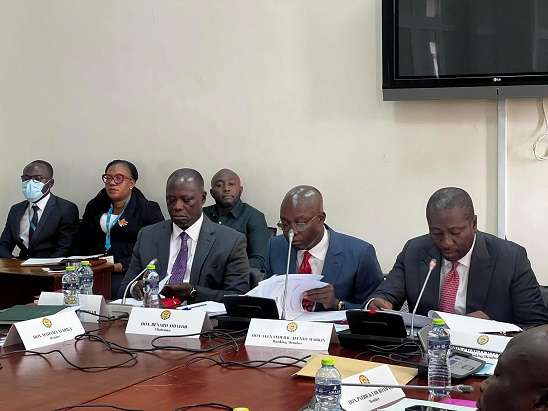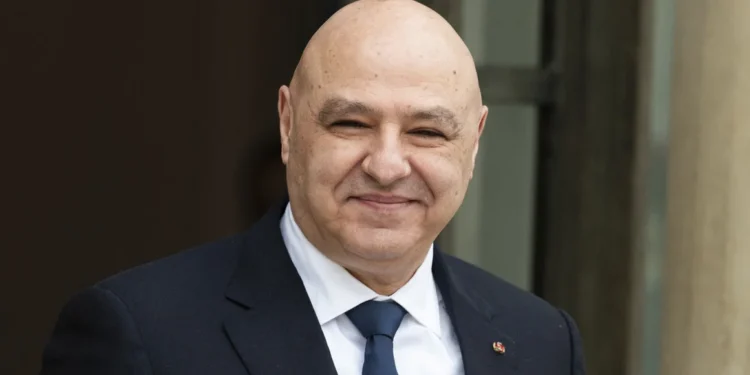The Chairman of the Appointments Committee and 1st Deputy Speaker of Parliament Hon. Bernard Ahiafor, has defended the legitimacy of the recent Parliamentary vetting process, emphasizing that parliament will continue its work despite suspension of some members.
Speaking on the process, he argued that parliamentary quorum was duly met, and the committee was within its rights to proceed with its work.
Addressing concerns about the vetting process, Hon. Ahiafor firmly dismissed claims that the absence of certain committee members undermined its credibility. He stressed;
“If a procedure is set down for a right to be exercised, that procedure would have been followed in exercising the right.’’
Hon. Bernard Ahiafor Chairman of the Appointments Committee
He argued that even if some members of the committee were absent due to unavoidable circumstances, their absence did not render the committee’s work invalid. Using an analogy to reinforce his point, Hon. Ahiafor explained;
“Let me reduce it to even a board level. You have a board of 11 members. For one reason or another, 2 of the board members have been suspended. It is left with 9 members of the board. Are you saying that the 9 members of the board cannot take decisions?”
Hon. Bernard Ahiafor Chairman of the Appointments Committee
He reiterated that the constitution and Supreme Court rulings had provided clear guidelines on quorum, referencing;
“I have looked at Article 102 carefully. I have looked at Article 104 carefully, and I am very much aware of the decision of the Supreme Court in the case of Justice Abdulai versus Attorney General on the issue of quorum. The Supreme Court has given a clear interpretation to Article 102 as well as Article 104 of the constitution. So, guided by the decision of the Supreme Court, I think two people out of the committee being suspended doesn’t affect the quorum of the committee.’’
Hon. Bernard Ahiafor Chairman of the Appointments Committee
Committee’s Work
Responding to suggestions that the absence of opposition MPs from the vetting process weakened its scrutiny, Hon. Ahiafor maintained that the quality of deliberations was not compromised. He firmly responded;
“The framers of the constitution were very much aware of all these things when they came up with Article 104. At any time, 50% of members of Parliament or a committee can deliberate. So, once we had 50% of the members of the committee, we could proceed to conduct our vetting.”
Hon. Bernard Ahiafor Chairman of the Appointments Committee
He also emphasized that the vetting process had been thorough and met all necessary legal and procedural requirements.
Committee’s Vetting and Questioning

Hon. Ahiafor also addressed the nature of questions asked during the vetting process. He pointed out that the rules governing the process allowed members to ask a limited number of questions and that questioning was structured for efficiency. He explained;
“At our committee proceedings, it was agreed before the commencement of the vetting that members are entitled to ask three questions. For every question asked, depending on the answer, they may be entitled to a follow-up question. The follow-up question will be at the discretion of the chairman of the committee, as it must flow from the answer given by the nominee.’’
Hon. Bernard Ahiafor Chairman of the Appointments Committee
He defended the conduct of the majority members, stating that both minority and majority members often chose not to ask questions if they were satisfied with a nominee’s qualifications.
The Chairman further criticized some of the questions raised during the vetting process, particularly those relating to tax compliance. He argued;
“None of us has the mandate of GRA. If the Ghana Revenue Authority has issued a tax clearance certificate for an individual before me, that should suffice that the person has paid their tax and has been certified by the authority. Is it my responsibility to be going into whether you have paid tax or not? That is the responsibility of the GRA to investigate.’’
Hon. Bernard Ahiafor Chairman of the Appointments Committee
He emphasized that tax matters should be left to the appropriate authorities and not be a subject of prolonged questioning during vetting. He charged;
“The law states in Article 94 that you must have fully paid your tax or made the necessary arrangements to pay. If the GRA, which is responsible for tax collection, has cleared a nominee, who am I to doubt the credibility of the GRA?”
Hon. Bernard Ahiafor Chairman of the Appointments Committee
Hon. Bernard Ahiafor maintained that the vetting process was conducted in full compliance with parliamentary procedures and constitutional provisions.
“At the end of the day, it is important that the public gets to know why nominees are vetted. Article 78 of the constitution states that for one to become a minister of state, they must otherwise qualify to be a Member of Parliament. The qualification of a Member of Parliament is set out in Article 94. Most of those vetted are already MPs, so determining their qualification is neither here nor there.’’
Hon. Bernard Ahiafor Chairman of the Appointments Committee
He dismissed concerns over the absence of some MPs, asserting that the committee met quorum requirements and conducted thorough vetting.
READ ALSO; Adekunle Gold Reflects on Overcoming Fear of Losing People





















